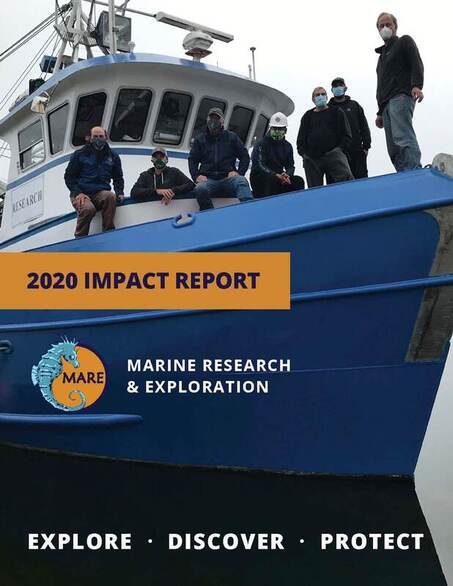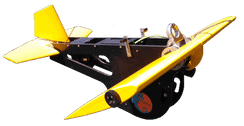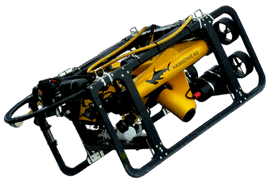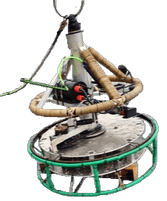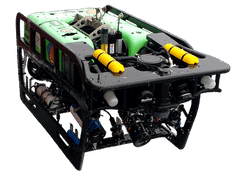2020 IMPACT
REPORT

MARINE RESEARCH
& EXPLORATION
EXPLORE . DISCOVER . PROTECT
Marine Research & Exploration (MARE) partners for intelligent ocean management. Our mission is to explore and document the world’s oceans, to support their conservation and stewardship for future generations.
With innovative technology, proprietary data collection tools and analysis, MARE collaborates with, and informs government, academic, scientific, and community-based organizations to affect change. We specialize in long-term ocean monitoring projects that track change over time, from resource management to environmental impacts; our focus is the biodiverse continental shelf, to depths of 1,000 meters.
Letter from the CHAIR, BOARD OF DIRECTORS

On behalf of MARE’s Board of Directors, we sincerely hope you’ve remained safe and healthy in 2020. It’s been a challenging year, and our home, our blue planet, is in a state of crisis. The dramatic events of the past year — relentless fires and record setting temperatures in the western states, repeated hurricanes battering the southeast, and the global pandemic — have demonstrated that the negative effects of human activity and climate change are undeniable. As a physician, I know that investing in early detection and intervention is critical to optimal health outcomes. This is true for the planet as well.
In the ocean, that means developing an understanding of the complete ecosystem so that we can recognize the effects of human activity, and how to prevent harm. This is what MARE does. We are in an era of incredible new tools for gathering information to facilitate Intelligent Ocean Management and, as we look towards 2021, we invite you to support MARE. Together we will pursue our vision for a healthy ocean on our blue planet.
Kerry Davidson, MD.
Chair, Board of Directors
OUR IMPACT
Letter from the EXECUTIVE DIRECTOR
MARE’s work is about the ocean, but fundamentally it is also about people. Messages of social justice and calls for equity from the Black Lives Matter movement resonated with me as a second generation American. My grandparents fled persecution in Poland and Russia to build a better life for themselves and future generations here. Inspired by their legacy, I am committed to doing my part to build a nation of true opportunity and equality for all, and that extends to our work at MARE. The ocean currently provides the primary source of protein for 3 billion people, which is why a healthy ocean is critical for future generations, and guides MARE’s mission to explore, discover and protect.
Throughout the turmoil of 2020, we have never lost sight of the vital need for healthy ecosystems. When one important part of our ocean is at risk, the whole system is compromised. We cannot afford to let that happen – above or below our waves. As with our oceans and social equity, the return on investment is greatest now.
Thanks to the support of MARE’s investors – dedicated donors, partners, staff, and Board of Directors – we successfully completed our ambitious expeditions this year, despite challenges presented by COVID-19. The result is vital new information to inform California’s statewide Marine Protected Area assessment in 2022. Critical decisions will be made regarding ocean protections based on this data, and we share this achievement with you, our ocean champions.
Margaret Mead’s famous words have never felt more significant.
“Never doubt that a small group of thoughtful, committed, citizens can change the world. Indeed, it is the only thing that ever has.”
Executive Director
MARINE PROTECTED AREAS
California pioneered ocean conservation in 1999 with landmark legislation, the Marine Life Protection Act, to protect 16% of its waters. This statewide act established a network of 124 marine protected areas (MPAs) along the California coast, conserving over 2,660 square kilometers. These MPAs are managed and monitored as a network rather than as independent reserves, demonstrating the interconnectedness of our marine ecosystems. Designed to safeguard California’s coasts and oceans, they protect the diversity and abundance of marine life, the habitats they depend on, and the integrity of marine ecosystems.
THE FUTURE OF CALIFORNIA’S MPAs
MARE’s unique partnership with California’s Department of Fish and Wildlife (CDFW) since 2003, enables us to quantitatively monitor deep-water sites within the MPA network to determine if protections have benefited the overall health of these nearshore ecosystems. In just the last two years, MARE has surveyed more than 400 kilometers of seafloor from four different ships, for California’s Long-Term MPA Monitoring Program. We collected evidence about how this network of reserves promotes resilience and sustains ecosystem biodiversity. Our ROVs collect visual and oceanographic information to document critical deep-sea ecosystems. This data is used to assess size and abundance of fish and invertebrate populations, general ocean health, and document change over time.
In 2022, a coalition of scientists and ocean resource managers will measure the effectiveness of California’s marine reserves in a comprehensive statewide review. They will compare historic baselines to newly collected datasets, including MARE’s extensive deep water data. This data, collected over the last 16 years, demonstrates change over time, in order to determine the impact of protections and management.
Together with our academic partners, MARE will review the data collected in 2019 and 2020, from protected areas and fished sites, and then compare it to our prior baseline ROV data sets. Many factors are considered in determining MPA efficacy, including health of kelp forests, sea bird populations, socioeconomic impacts of regulations, and tribal knowledge, in addition to deep water data. By concurrently measuring how both protected and unprotected areas change over time, we are able to scientifically assess the impact the reserves have had. MARE’s contribution to MPA research provides scientific reference points to support resource management decisions, and advances the development of sustainability-focused policy.
Successful MPAs serve to enhance economic sustainability as well as environmental sustainability. A vibrant, biodiverse ocean allows for recreation, fishing, and transportation, without compromising critical marine ecosystems. Conservation efforts provide sustenance for coastal communities as a source of nutrition, as an economic driver, and as a central part of their culture, over generations.
MARE Technology: Our Window to the Deep
100 METERS DEEP – Benthic Assessment Towfish (BATfish)
A fully retrofitted Phantom-class ROV customized to gather seafloor habitat and biological information at depths of 15 to 250 meters.
250 METERS DEEP – Hammerhead ROV
This lightweight maneuverable towed glider provides seafloor and mid-water HD video to depths of 100 meters and is operable from a small boat with minimal crew.
350 METERS DEEP – Stereo Video Lander
Our stationary stereo camera system, with panoramic camera rotation, allows researchers quick access to marine habitats at depths down to 300 meters.
1,000 METERS DEEP – Beagle ROV
Our flagship vehicle provides ocean imaging and sample collection. The Beagle delivers live HD video, stereo video and water quality information and is rated to 1,000 meters deep.
As we head into the United Nations International Decade of Ocean Science for Sustainable Development, the need for intelligent ocean management supported by science and technology has only become more pressing.
Deep Sea Corals
Similar to California’s famous redwoods on land, deep sea corals are the ancient forests of the ocean, and provide a habitat for precious marine life. MARE’s deep sea coral research, done in collaboration with the National Oceanic and Atmospheric Administration (NOAA), has revealed evidence of their vulnerabilities to changing ocean conditions. Armed with this knowledge, scientists and resource managers are learning how to recognize environmental threats and better protect these ecosystems. Indeed, it is crucial that they be protected, for they are the nurseries and critical habitat that are the foundation of a healthy marine ecosystem. With extraordinary evolutionary properties that allow some to live for thousands of years, their potential is just beginning to be understood. Deep sea corals and sponges have contributed to COVID test kits, cancer and anti-inflammatory medical treatments, and are being evaluated for even more pharmaceutical discoveries.
In 2019, MARE partnered with NOAA’s Olympic Coast National Marine Sanctuary to locate vulnerable deep-sea corals and sponges within the sanctuary. By deploying our ROV Beagle, we captured imagery of benthic habitats, and collected invertebrate samples for identification in this mostly unexplored and unmapped area.
A new study by University of Edinburgh, Heriot-Watt University, and a broad group of NOAA researchers utilizing MARE’s ROV surveys, shows that the waters off the California coast are a natural laboratory for observing how ocean acidification can cause crumbling in coral reefs. Coral skeletons were analyzed over time to improve understanding of skeletal weakening mechanisms under conditions of ocean acidification. California’s coastal ocean has a naturally low pH compared to many of the other regions where cold-water corals build reefs. These low pH, low carbonate waters make it difficult for hard corals to grow into large reef structures. Scientists identified that a condition known as “coralporosis” – a newly coined term where reefs crumble from ocean acidification – has striking parallels to osteoporosis in people.
Ocean acidification is progressing rapidly along the California coast, and most cold-water hard corals are now living in conditions that can lead to structural collapse. The information from researchers and the coral samples taken with MARE’s ROV Beagle will help resource managers globally to quantify which cold-water coral ecosystems are at risk, when they will be at risk, and how their loss will impact biodiversity because of ocean acidification.
“Deep-sea corals growing off Southern California are a window into the future ocean. The region is a natural laboratory to study the effects of ocean acidification.”
— Dr Peter Etnoyer, NOAA, National Centers for Coastal Ocean Science
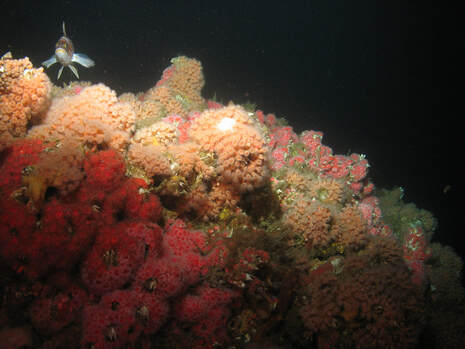
A Copper Rockfish (Sebastes caurinus) hovers above a strawberry anemone (Corynactis californica) covered rock in the Ten Mile State Marine Reserve along the Mendocino coast.
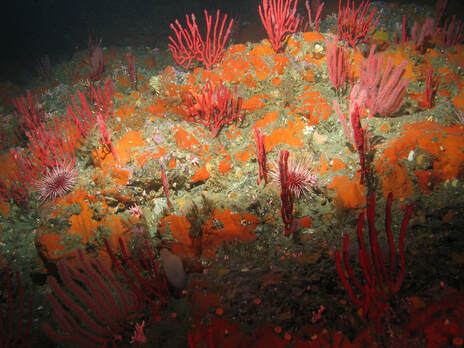
Red Gorgonians (Lophogorgia chilensis) among red sea urchins (Mesocentrotus franciscanus) in the depths off of Northern California.
HAWAII
MARE will cross the Pacific to Hawaii in 2021, bringing our technology to assist in the State’s “30 by 30” initiative to effectively manage 30% of local waters by 2030. Using our deep water robotics we will augment existing research, by going deeper, to identify hot spots in mesophotic reefs off the coast of Maui.
Our 2020 plans were upended by the COVID-19 pandemic, and our planned expedition in April was rescheduled to the fall, to work around the Humpback whale migration, in and around our target sites. Due to the current COVID spike, MARE now aims to survey in Spring 2021.
We are proud to partner with the Hawaiian Islands Humpback Whale National Marine Sanctuary, and remain hopeful of using their research vessel, and regional expertise.
DEEP SEA ROBOTIC CHALLENGE
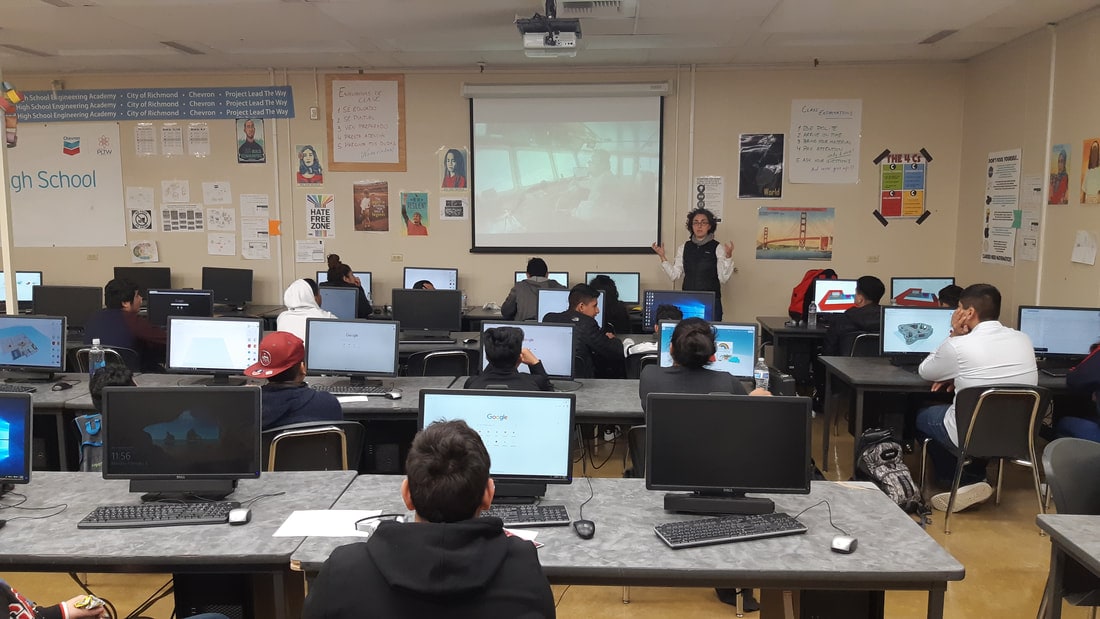
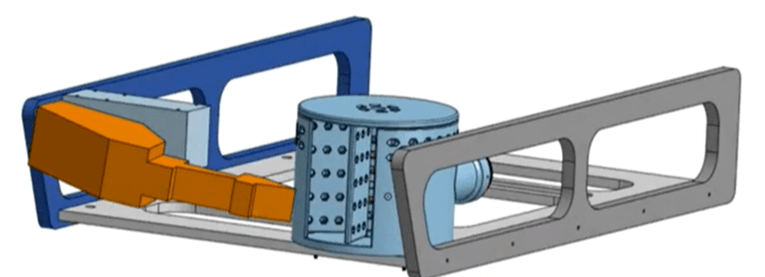
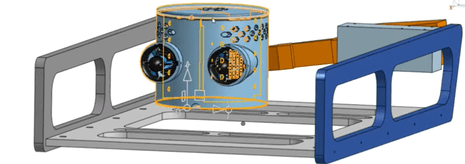
MARE partnered with Richmond High School to pilot our first Deep Sea Robotic Challenge. Students were presented with a real-life scientific problem: to design a deep sea coral sampling device to collect specimens at depth. The pandemic threw us all a curveball, but we successfully adapted many of the Challenge’s elements to accommodate remote learning. Student teams were guided, coached, and supported via Zoom, FaceTime, and other platforms – the magic of modern technology! They even received a virtual tour of the ROV at MARE’s Headquarters, including a Q&A with Dirk and Rick. Mentors with engineering or marine-related professions worked with students to support them as they developed their prototypes. The teams described and defended their designs via recorded video files sent to the judges for review. Students also learned more about MARE’s work, and the need for conservation and stewardship of our marine environments. We are so proud of the students for their hard work, and impressed with the sophistication of their designs. We look forward to repeating the program again in 2021!
A special thanks to Richmond High School, Jose Luis Cebrian Marquez, students, mentors and the judges who made this program possible!
NEW HORIZONS
EXPANDING THE BOARD

The MARE Board of Directors is proud to welcome Mansi Konar. Mansi brings immense value as an international economic advisor on ocean economics, environment and climate, and is based in the UK. She has provided global economic advice to the High-Level Panel for Sustainable Ocean Economy Secretariat, consisting of 14 world leaders from developing and developed countries, committed to transitioning to a Sustainable Ocean Economy. She previously worked for 11 years as a senior Economist and Strategist in the UK Civil Service on a range of high profile international and domestic policy issues, including assessing and evaluating the impact of policies focusing on improving the health of oceans.
As the lead Economic Advisor to the Marine Programme in the Department for Environment, Food and Rural Affairs (UK Government), she developed the evidence base that informed the designation of UK’s Marine Conservation Zones and the implementation of the EU’s Marine Strategy Framework Directive in the UK. With her deep knowledge and informed perspective, she is well positioned to support MARE’s vision of Intelligent Ocean Management.
EXPANDING THE FLEET
Long term supporter, Tom Louderback, profoundly understands the need for scientific research of our oceans in order to protect it. As a lifelong recreational fisherman, Tom was initially opposed to marine reserves, as another restriction on the everyday people who enjoy the outdoors. After a dive trip to Baja, he saw firsthand the astonishing difference between the “open” waters of the East Cape and the Cabo Pulmo protected area, and shifted his position immediately. Tom sees the vital role MARE plays in marine management decisions, bringing critical information to those who need it most. When he was considering parting with his 38-foot catamaran, he knew just where to go.
This generous donation will expand MARE’s underwater survey capabilities, and provide the flexibility to respond quickly to pressing opportunities. The boat is the perfect platform for MARE’s BATFish and other smaller ROVs, and we plan to put it to good use, partnering with new organizations in exploring the West Coast.
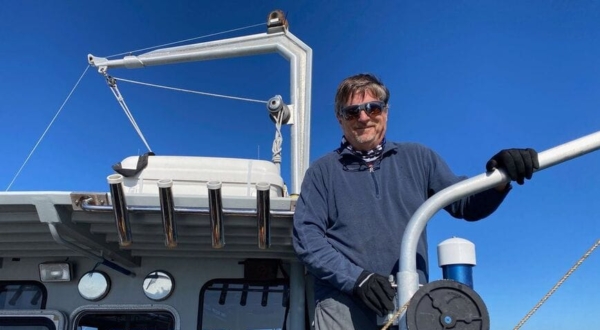
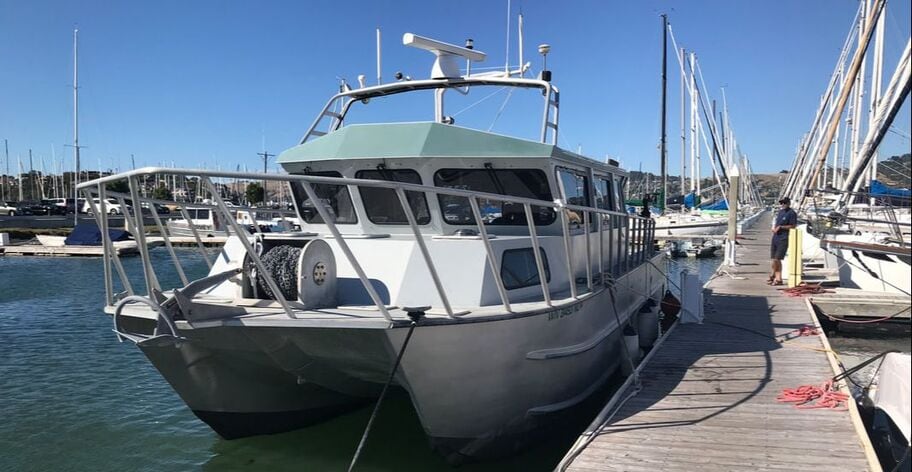
DEDICATIONS
This year, MARE honored the leadership, vision, and legacy of two giants of
ocean protection by dedicating our expeditions to them. Their commitment
to making the world better has inspired us all.

MARE dedicated the Central & Northern California Expedition to Huey Johnson, a longtime environmental hero and Rebel with a Cause, who passed away this July. An early MARE supporter, and mentor, he worked on many paramount environmental protection projects, such as co-founding the Trust for Public Land, helping assemble the Golden Gate National Recreation Area (one of our most visited National Parks), founding Resource Renewal Institute, and preserving the Bolinas Lagoon.

MARE is honored to dedicate the Southern California Deep Sea Expedition to Gregg Bemis, MARE’s first Board Chair and owner of the Lusitania, who passed away this May. An avid diver, he was raised on the coast of Massachusetts, spending his time on and in the water, and was a long-standing supporter of MARE, consistently challenging us to solve ocean issues entrepreneurially.
OCEAN CHAMPIONS
Reflects donations received July 1, 2019 – June 30, 2020
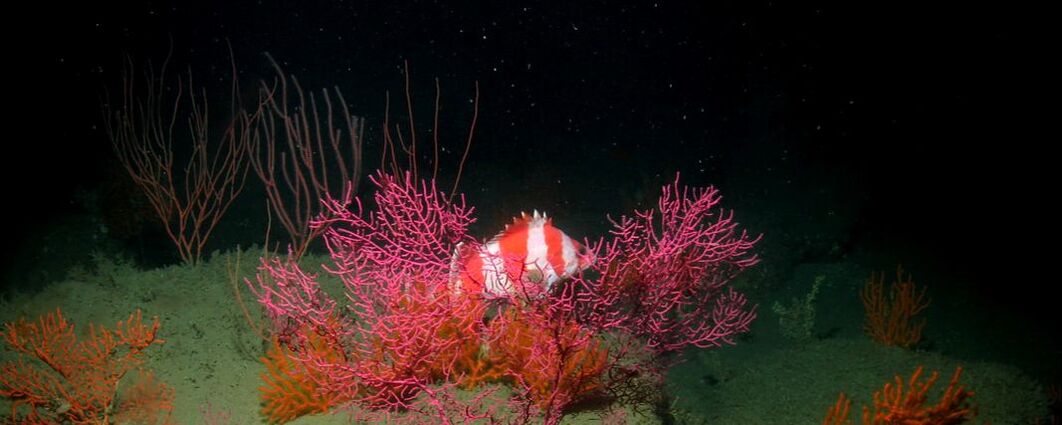
100,000 +
The Dean and Ann Witter Fund for Charitable Giving
$50,000+
Anonymous
Danish Explorers Fund
Peter J. Davis Family Foundation
Robert & Lisa Margolis Family Foundation
Paul M. Angell Family Foundation
$25,000 – $49,999
Harold K.L. Castle Foundation
HRH Foundation
Schmidt Family Foundation
$10,000 – $24,999
Emmett Family Foundation
Jon Graham & Elizabeth Ulmer
Thomas Louderback
$5,000 – $9,999
The Baum Foundation
Jeannie Blaustein & Peter Bokor
Climate Ride
Laura Francis
Lorenzo Kampel & Ann Rosenberg
Point Richmond Gateway Foundation
Peter Donnici Larry L. Hillblom Foundation
SunPower
James Tustin
$2,500 – $4,999
Kerry Davidson & Dan Fitzgerald
Allan & Laura McCarthy
Lawrence & Ruth Rosen
$1,000 – $2,499
Anonymous
Christopher Cherney
Seth & Allison Ferguson
Thomas Frost
Sandra Gross & Eric Whitaker
Mary Daniel Hobson
Jeff & Mia Ludlow
Kevin McEvoy
Kathy McKenna
Lindsey & Ken Meyersieck
David Miller
Brian & Heidi Miller
Gloria Oakes
Chris Oakes
Larissa Pommeraud
Robert & Nancy Praetzel
Dirk Rosen & Pamela Rich
Martin & Joan Rosen
Blanca Señor & Chris Hausser
Karen & Pete Weber
$500 – $999
Kellie Aamodt
Craig Collins
Douglas & Jane Ferguson
Michael Gallagher
John Griffin & Lynn Richmond
Tanis & Seth Hammond
Lewis & Suzanne Jester
Barbara & Michael Johnson
Marc Lopata
Shuba Raghavan
George & Linda Sensabaugh
Michael Shearn & Anna Beck
Nancy Weinstock
$100 – $499
Alacosta Divers Inc.
Judith & Kenneth Ardaiz
James & Rebecca Austin
Gregg & Lisa Bemis
Alicia Bihler & Owen Bissell
Doug Canepa
Kia Conn
Karl Danz
Alexis Donoghoe
Don Duncan
Douglas & Jane Ferguson
Serena & Billy Fox
Scott Frost
Aviva Garrett & David Doshay
James and Jane Griffin
Patrick Hadley
William Headapohl
Mia Hershiser
Kelly Hoglund
Matthias Horn
Richard Hoyer
David & Rose Jeffrey
Jim Jones
Keegan & Coppin Company, Inc.
Linda Lippstreu
Noel Massie
Martin & Janis McNair
Kathryn Morris
Bob Pedro
Barbara Peelor
Ann Rich
Daniel Richards
James Rockafellow
Angela Rule
Glenn & Liliko Sakima
Bill & Katie Shelmerdine
Matthew Siben
David Striegel
Rex Thomas
Simon Tompson
Dirk Van Waart
Randall Von Wedel
Pamela Wayne
Evan Weissman
Shelly Willard
Adam Wright
Valerie & Howard Wynn
KELLIE AAMODT
ALICIA BIHLER
DR. KERRY DAVIDSON MD [Chair]
MARK GORDON
JON GLASSMAN [Vice Chair and Secretary]
THOMAS FROST
MANSI KONAR
LAURA MOSS
CHRIS OAKES
LARISSA POMMERAUD [Treasurer]
DIRK ROSEN
NATASHA BENJAMIN
RICK BOTMAN
JONATHAN CENTONI
GRETA GOSHORN
ASHLEY HAILER
STEVE HOLTZ
DAVID JEFFREY
NISSA KREIDLER
ANDY LAUERMANN
HEIDI LOVIG
SAM PARKER
DIRK ROSEN
ISAAC TRAVERS
Special thanks to the employees at Apple and Google, whose donations were generously matched by these companies.


INCOME
TOTAL: $1,277,911

EXPENSES
TOTAL $1,240,831
